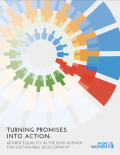
This IEA report charts a possible path for energy use and CO2 emissions in 2020. In response to the exceptional circumstances stemming from the coronavirus pandemic, the annual IEA Global Energy Review has expanded its coverage to include real-time analysis of developments to date in 2020 and possible directions for the rest of the year.

This brief provides a checklist of practical steps that organisations can take to respond to the COVID-19 crisis.

The COVID-19 crisis has caused economic shockwaves around the globe, highlighting the interconnectedness of countries through global value chains and the importance of a resilient trading system. Appropriate trade policies and regulations can help accelerate the post-crisis recovery. This policy brief focuses on Aid for Trade as a means to promote green trade and build climate resilience.

This global monitoring report takes stock of ongoing trends and challenges based on available evidence and data. It looks at both the ends (goals and targets) and the means (policies and processes) that are needed to achieve gender equality and sustainable development.
The OECD Environmental Policy Committee (EPOC), through its unique database of Policy Instruments for the Environment (PINE), collects quantitative and qualitative information on policy instruments, in more than 80 countries worldwide. This resource presents statistics on the biodiversity-relevant economic instruments and the finance they mobilise, based on currently available data in PINE.
